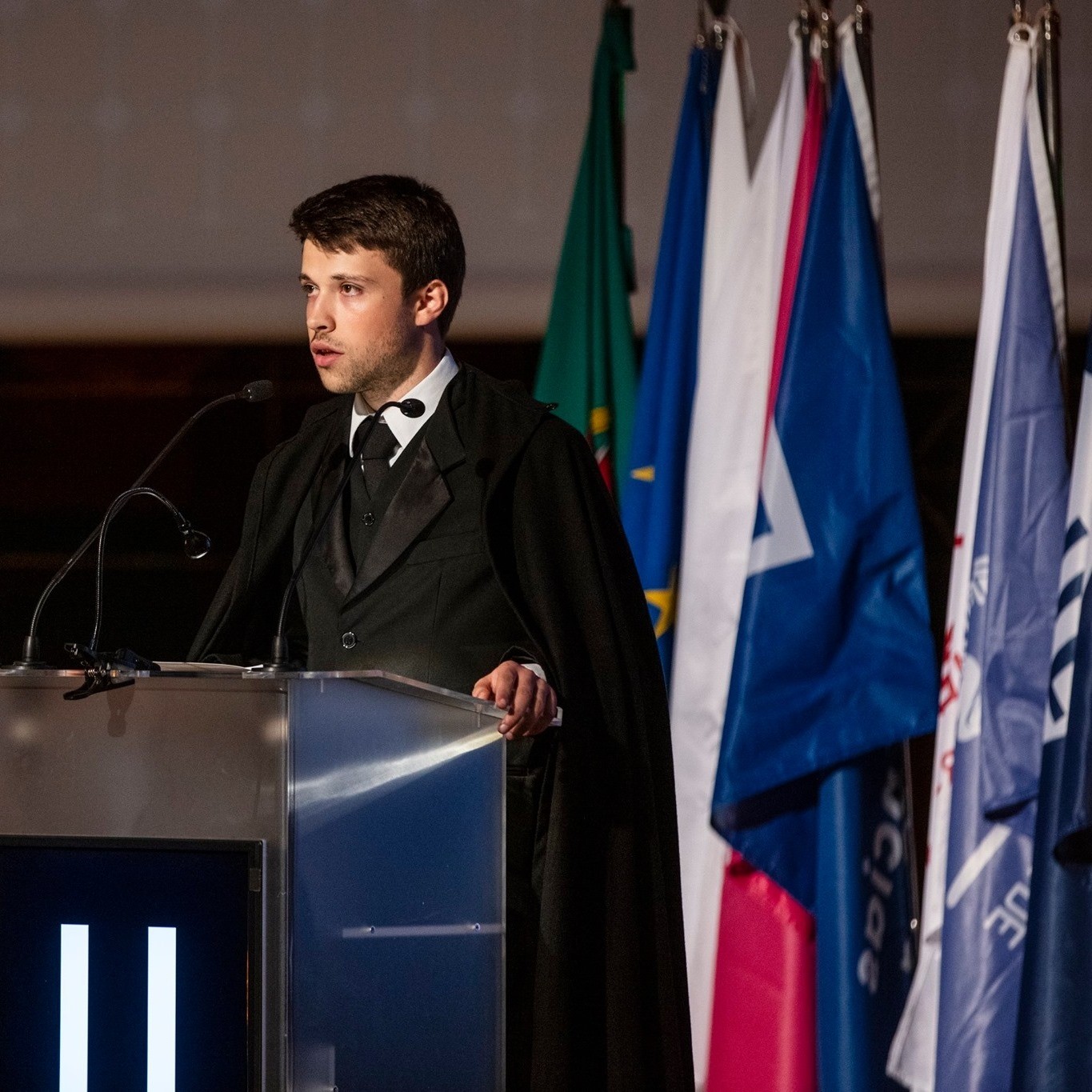
The deal was to stop by the Students’ Association at 3 pm to start the interview. He sends a message postponing it for 10 minutes because he is finishing his lunch. At 1 pm, he left Internal Medicine, where he carries out his internship daily as a final year student..
When he arranges a time to meet someone, he does it exemplarily on time. Therefore, I am not surprised that, when I get there, he is excitedly fulfilling one of his excellent roles, that of public relations.
Ana Isabel Jesus, the long-time treasurer of the AEFML is at the entrance, and he is talking to her, pointing out that weekend luggage cannot be spread out at the entrance. Most of our students are from outside Lisbon, and on weekends they visit their families. Having a place to store luggage is understandably necessary.

He has the merit of having shortened the path between the Faculty and the Students' Association as their maximum representative. This is the great work he has done with extreme diplomacy, dedication and panache, always with a low profile, avoiding the tempting superiority of those who take on positions of visibility.
José Rodrigues is still, at the time of writing this article, the President of the Students’ Association of the Faculty of Medicine of Lisbon. At 23, he is the eldest son of two boys born in Guarda, but both studying in Lisbon. The son of a lawyer and an economist, his background gives him an ingrained ethics and sense of family, everything else is genuinely intrinsic to him and to his character.
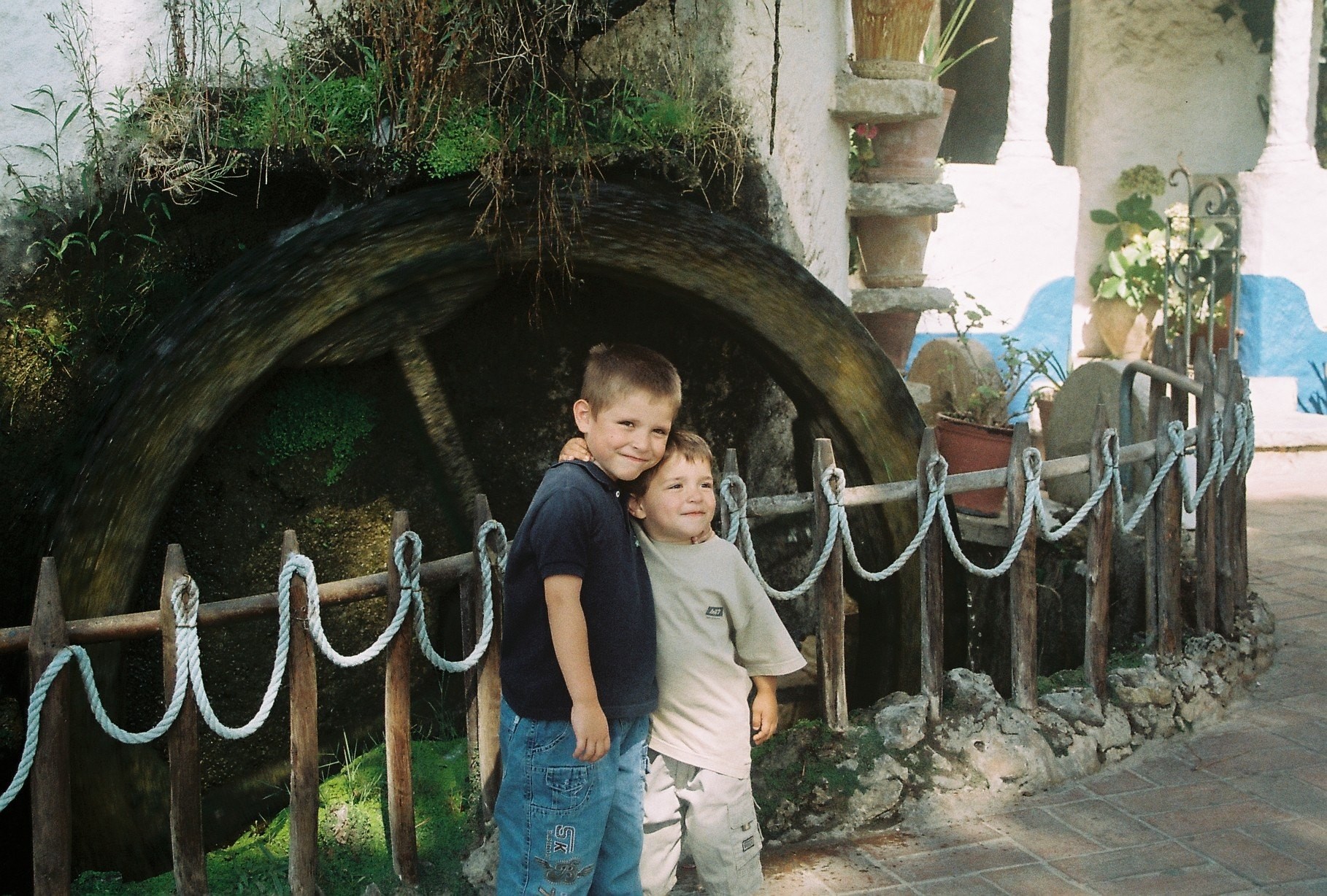
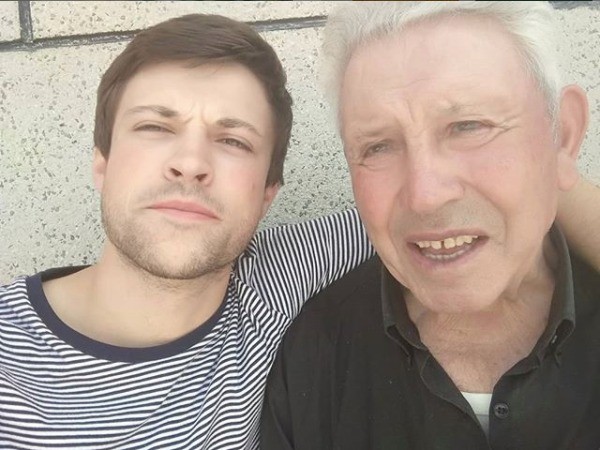
He arrived in Lisbon in 2015 to study the Integrated Master Degree in Medicine. On 12 June 2019, he was elected President of the Students’ Association of the Faculty of Medicine of Lisbon. Ever since we met him, he has been saying that “it is the generosity inherent in the profession” that keeps him interested in Medicine.
In fact, he has been in the AEFML for 4 intense years, which kept him very busy and made him feel much alive. But the last year and 4 months were characterised by long days of work, without the right to having private time, enough hours to sleep and holidays to be able to relax. We crossed the garden of Santa Maria Hospital, and in the process, he meets many people, to whom he speaks kindly and with a familiarity that indicate that this is often his first home. I suggest sitting down on a metal bench outdoors, because I think I can get him out of his comfort zone if we leave the AEFML, but I don't succeed. He accepts the challenges, but does not risk them if it means being out of depth. "We sit here, fine, but we keep a safe distance". He sits on the end of the bench, I sit on the other end. This is how he is in everything, the first to comply with the rules, even if no one is watching, as he believes that if they exist, they should not be ignored.
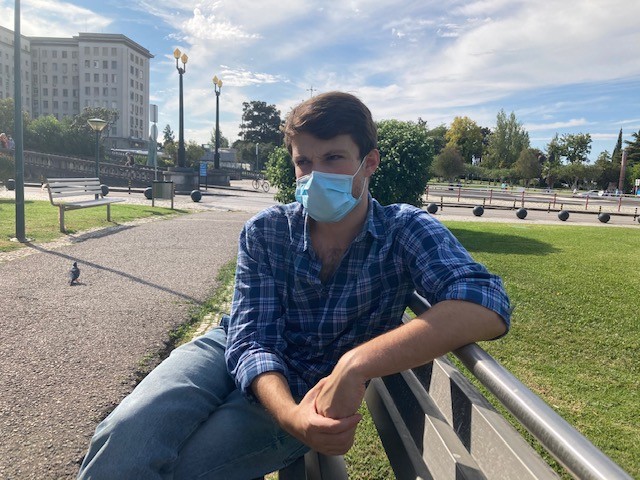
This explains that no matter how much he likes someone, he will not get close if it involves risks. The grandparents know this well, for months he did not visit them due to the pandemic. At the time he told me that the home visits would end due to his love for his paternal grandmother. In the intervals, he published photographs with his maternal grandfather, to fill in the sense of longing, which he always verbalizes very discreetly and keeps private, even from friends. I return to the conversation in the garden. He takes the watch off his wrist, a gadget that is synchronized with his phone. He clearly defies time by telling it that he is not afraid to let it control him. And he meets the challenge without temptation. It is the first time that he has not looked at a fragment of time for seconds, the same time that gave him resilience and self-control. A diplomat and appeaser by nature, he has a keen critical spirit, but he expresses his views without attacking anyone, without invading other people's space. His wisdom surpasses his physical age. He has gained many supporters who allowed him to intervene more and more. Without knowing exactly when it started, he became a daily element of teams, the creative element, representing the counterpoint and extension of ideas and wishes, regardless of the working group.
The first questions are always the easiest to ask, I think, as I inform him that I will take pictures of him as he speaks and that I will record our conversation. He looks comfortable with everything, but never forgets that I will be recording and capturing everything. While talking and recalling moments, which he always describes in positive form and without excessive emotion, he makes small curls with his index finger on his straight brown hair, which always falls smooth as soon as he lets go.
We have been trying to agree on the right date to speak for months, his only concern was not to overshadow dates or events he was no longer involved in. He denotes some detachment from the avalanche of adrenaline he had throughout his term of office.
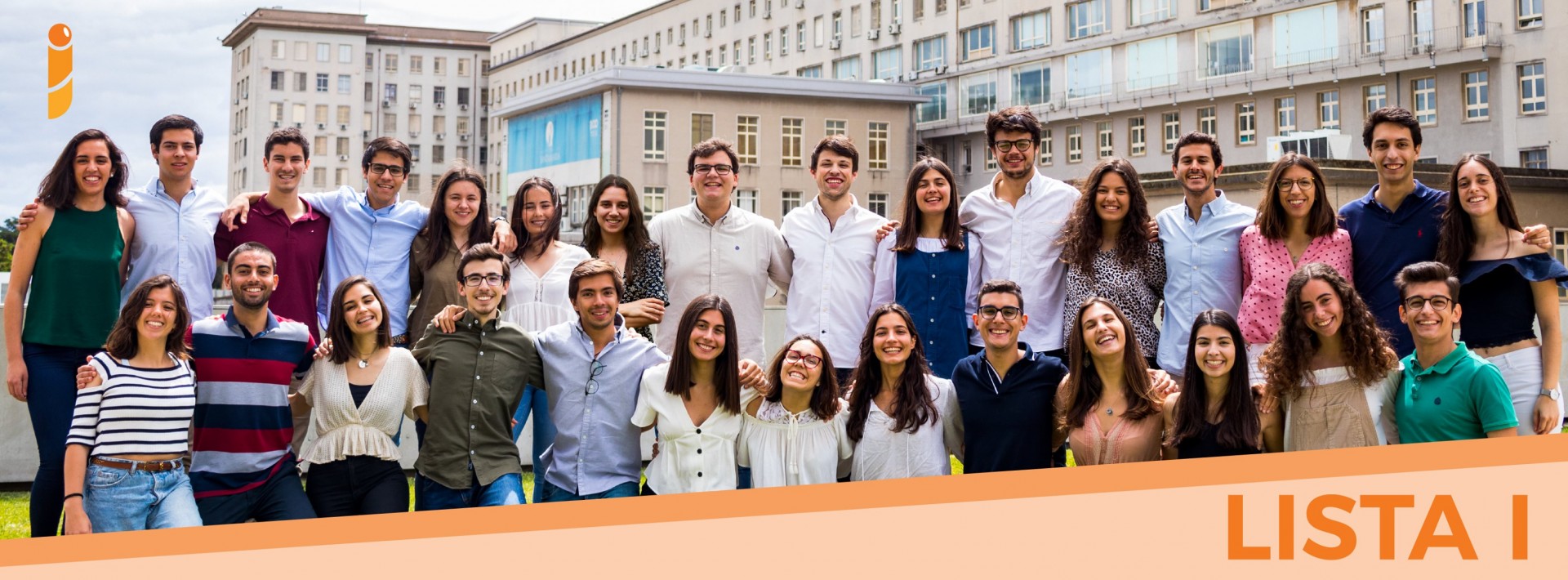
You are almost at the end of your term of office as it ends in October. But how does everything come about? I guess it starts with passing on the information to others.
José Rodrigues: Passing on the information is an ongoing process, done in stages. I started to receive information from the previous board a year and a half ago. I reflected a lot, read and analysed the functioning of everything. This first awareness of everything is followed by the next job of choosing the main people and analysing visions and ideas. Every person who decides to move forward has already thought about what things he or she would like to do most and what fulfils him or her more. Afterwards, people meet to discuss global issues and evaluate what is feasible to do. It is with this common vision that later we identify the rest of the people for the Departments. Only in this phase does a department grow, embodying a set of attitudes and initiatives within the Faculty and in several communities with which the Association has partnerships. So there is no single moment, everything is done in stages.

Were you challenged to run for President of AEFML?
José Rodrigues: It was a natural path to follow, as in the previous term I had gathered some experience to take on this greater commitment. I had been at the AEFML for some time and I thought I could make a good contribution. I spoke with Leonor, the person who was in the Board longer and at the same time as me. The two of us not always agree about everything, which is natural and desirable, but in the initial decisions we were always very balanced and consonant. She supported me and that's why I decided to run.
Is it after this conversation that you began to challenge people so that each one chose his own department and team?
José Rodrigues: We started to think who the rest of the vice presidents would be. It was equally important to find the treasurer, a difficult task, but very well accomplished. We identified the department coordinators, and then we made a change that we consider to be particularly positive. The Human Rights department became the Responsibility and Social Welfare department. We never discarded Human Rights, but as Higher Education students and future doctors, we also wanted to show concern for and dedication to other very important causes.
In your first interview to the Newsletter, after taking on the position of President, you presented three main pillars as priorities: environmental awareness, safeguarding the student/athlete status and volunteering and social awareness. Were you able to do it?
José Rodrigues: We conducted many environmental awareness initiatives and built a strong environmental health partnership with the ISAMB (Institute of Environmental Health) represented by Professor Osvaldo and Dr Ricardo Santos, which was very positive for both sides, bringing content and giving more prominence to environmental issues. We wanted to show the impact of environmental consequences and it seems to me that we have managed to raise people's awareness. It is ironic that 2 or 3 days before the Faculty closed, we went to buy environmentally friendly waste bins for AEFML spaces. And we have them in the various rooms, but they have been little used, because the pandemic forced us to close the spaces. I hope that they will last longer than the pandemic so that they serve their purpose.
Does this mean that most of your wishes were not fulfilled?
José Rodrigues: There was no time to implement the environmentally friendly waste bins’ circuits, for example. As for the volunteering project, both in Social Welfare and Public and Sexual Health, we brought together existing projects and developed them, the Nexus project being an example of this. Even during the pandemic, we never stopped creating more initiatives. Another example was the organization of blood samples for serological tests at the Faculty in collaboration with the University of Lisbon. Also now with the Secretary of State for Migration, we are promoting a project to raise awareness and promote training among the migrant community and asylum seekers. The students supported this campaign a lot. Despite the limitations that we have now, they maintain a very humanistic approach even in the most complicated situations. They were already supportive, but now they are more than ever. Regarding the student/athlete status, although somewhat affected by the pandemic, the order of the University of Lisbon was published in July, and in August it was worked with the academic area and adapted, which allows the Faculty to adopt the status. I believe that its announcement will be made very soon.
The truth is that a year is almost nothing to be able to implement so many plans.
José Rodrigues: There is little time to do everything.
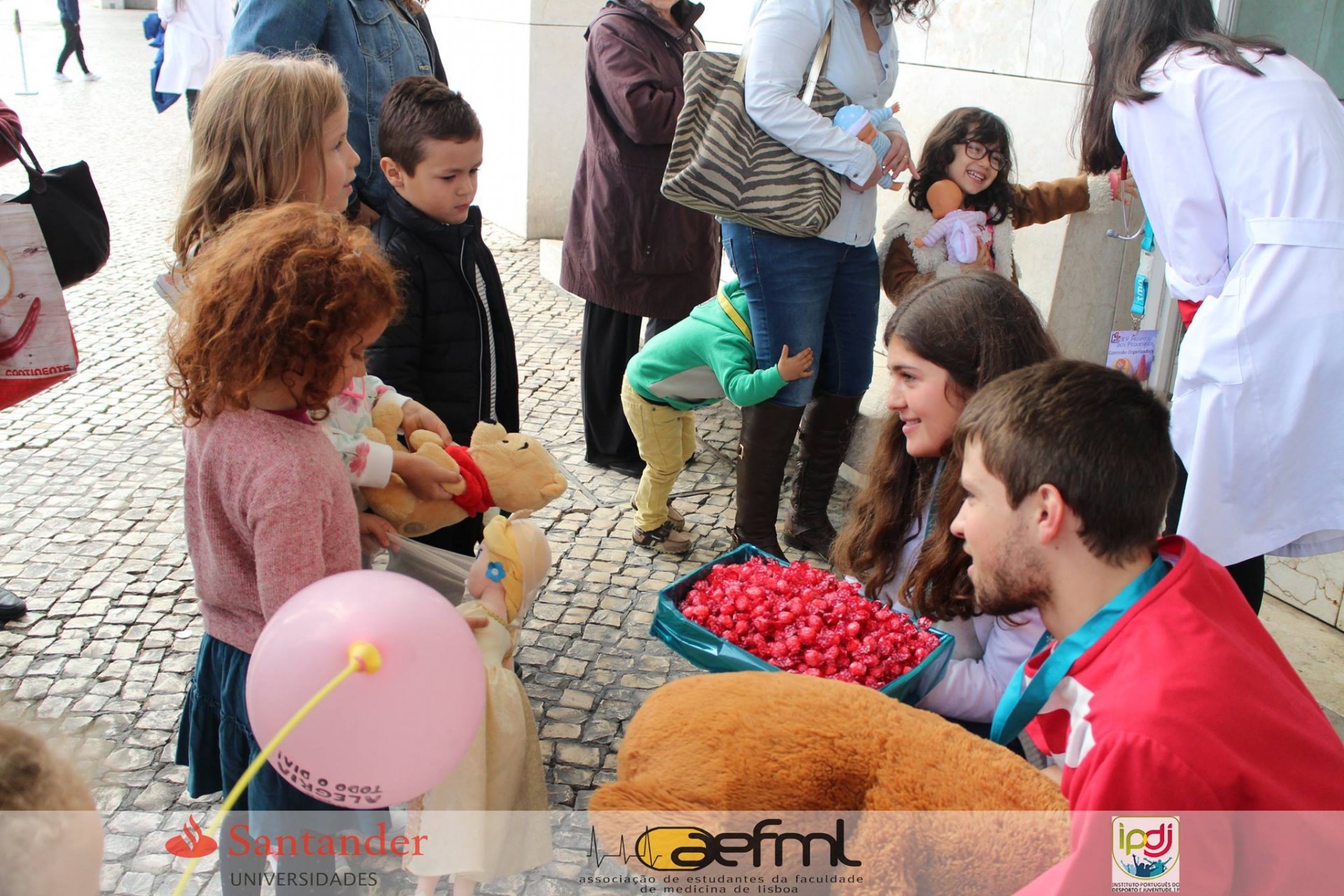
Let me provoke you. Some time ago you told me that many times outsiders understand that a Board has work done only if it is palpable and visible to everyone, such as the construction of the new students’ bar. If there is no tangible work, is it as if you had not dreamed of and implemented projects?
José Rodrigues: (Hesitates) This question ... Well ... A year ... In a more abstract or general way, a year in the Association is something very subjective, because the perception of time depends a lot on our mood. Right at the beginning, when we feel enthusiastic to start, we want the electoral campaign period to end, to be elected, the taking office period, and it seems that days are too long and that everything is still far from happening. Despite being so close, everything seems to be so far away. Then when we spend our days at work, we just want the days to get bigger so that we can do everything we want.
Then the exam season comes and we think that time passes too quickly and that we will not have time to study everything that is necessary. Then we go back to the quick gear of life in the Association and all we want to do is extend our days more in order to do everything. When we started to reach the end of the term, we started to realize that we should have had more time and that this period will leave a combination of longing, with the feeling of great dedication, contribution and many hours dedicated exclusively to the project. Therefore, we also feel that the time has come to give others the opportunity and the leadership, so that new opportunities and, ideas come and they leave the place a little better than how they found it. This is the summary of a time that, being long, seems so short... In normal situations, each Board has the dream of making that year the best. This dream, which belongs to all who go through here, made sense until the extraordinary moment that we are experiencing now. Perhaps only decades from now we will see the true impact of everything we are experiencing, but there is probably nothing more strange, disruptive and with as much impact as today's pandemic. We had many dreams, such as renovating the computer room, changing some things in the Professor Eduardo Coelho room ("Fish ball" room) and modernize the Board’s room, but none of these will ever do justice to being President and the Board when COVID-19 broke out. Not because of our responsibility, but because we will have a biographical profile much more striking than any other Board.
Do you want to tell me about this phase that we continue to experience and marked a good part of your term? In a figurative sense, the image I have is of someone who is running at great speed and suddenly hits a wall and forcibly uses the breaks. Emotionally speaking, how does someone who represents a team deal with adversity?
José Rodrigues: (Thinking about it) Yeah ... Despite everything, it has been more than six months since the pandemic arrived in Portugal and the total paralysis of our country and now I think that we can already look at it with some insight. The first thing I can say is that the world does not end, life continues, not in the same way that enables to bring about so many dreams and projects of a remarkable group of students, but it does not stop. All students from the organizing committees made a very strong imprint to what was done and conveyed a huge sense of belonging to the Faculty. In the beginning, at the first impact, when it was necessary to cancel practically all major initiatives (Olympics, AIMS, Cultural Soirée, Health + Solidarity Race), we did not go into despair, sadness, or frustration, because there was not much time for that. The FMUL Board posed a problem, discussed it with us in a very open and cooperative way about possible paths and, once again, a very good relationship and work between the Faculty's Board and Administrative Team and us was evidenced. In record time, there was effort, collaboration and commitment to move on in the face of extraordinary situations for which there were no answers then. So, I can tell you that the first impact provoked a big adrenaline rush and "we have to solve it because we are leading". We had many people dependent on us and there was nothing written on any activity report indicating what we should do. There was no one to contact or to ask for help. That is why we had a very strong mission spirit in this initial phase. We had to make important decisions, like canceling and returning money for various activities already paid for by the students. Afterwards, and as after a huge adrenaline rush, the anesthetizing feeling came. The one which, even before going to sleep, already makes you feel too tired. You know that human warmth and closeness are very important and we were left without it ...

What changes?
José Rodrigues: We were very close and had many activities. Even if it was just going to drink coffee in the students' room, or have lunch in group, but the truth is that we were in close contact, that is the cement of a Students’ Association. All this has been lost and eroded by the absence, which was aggravated in the following months when it was important to decide some things. Without physical presence, it was difficult to motivate people again. Our mission, in fact, was not over, we needed to remain relevant to our students. This was the most difficult part, we ourselves needed strength and then pass it on to others, in an adverse condition hitherto never experienced. We went back to our parents' houses and lived with them for a long time. We experienced a new method for classes, we stopped seeing each other. And finding motivation every day for all this, was a test that was successfully overcome! Now we are back to this final stretch where the priority was to prepare all our services to welcome students back and in the best possible way. I must highlight the role of our Vice-President Humberto, who was very dedicated to this operation and without whom the AEFML would not, at the moment, be prepared and robust for this new reality.
Is there any nostalgia, or is it still early?
José Rodrigues: Sometimes. (Pensive)
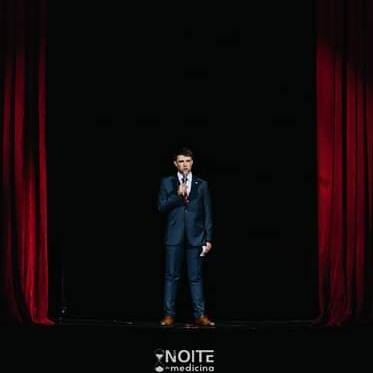
Can you give me some examples?
José Rodrigues: With the writing of the activity reports and the various actions that were carried out, we feel this nostalgia. We relived memories of the end of the party where we ended up very tired, but exchanged very enjoyable social moments. Moments like buying something for an activity, or carrying boxes for another project. We also remember the beautiful people with whom we contacted and the friendships that were born as a result. Beautiful things are done in the AEFML. That is why so many are so fond of the Association, because there are many projects and initiatives that speak for themselves. The simple fact of entering this boardroom after so many months away, causes a lot of nostalgia... But for now it is still a spontaneous nostalgia emerging. We have already held the last Board meeting and taken stock of everything that has been done. Now, the greatest nostalgia will be the formal change, not the change itself, which is something happy, because it brings rebirth and a new beginning, but it is the work that took us there, the closing speech, compared to the one when I took office. I think of the beginning, in what was a childish idea and now can be seen as ignorance (laughs). I also know that when I start to review all my photographs, since 2016 until now, I will feel a strong impact, especially because I will review moments as remarkable as the general assemblies of the ANEM (National Association of Medical Students) that lasted the entire weekend and we didn't sleep at all. But we were always there, committed, having ideas. These meetings and others make us feel very close. There are also incredible memories of the various Medical Olympics, anyway... All these reflections will be very important for me to close a cycle of my life.
What did you give up to manage in a short time everything that is required in your functions?
José Rodrigues: It depends on each person and the way each manages life. In my case, it involved giving up a few hours of sleep per day, only counterweighed on some weekends. One also gives up some family time and even when going home, there are times when we need to continue working. We miss some good times with the usual group of friends, both from the Faculty and from high school. The latter are even more missed because we all end up in different cities. But I also think that when we like people, absence does not let the feelings that we have for them fade.
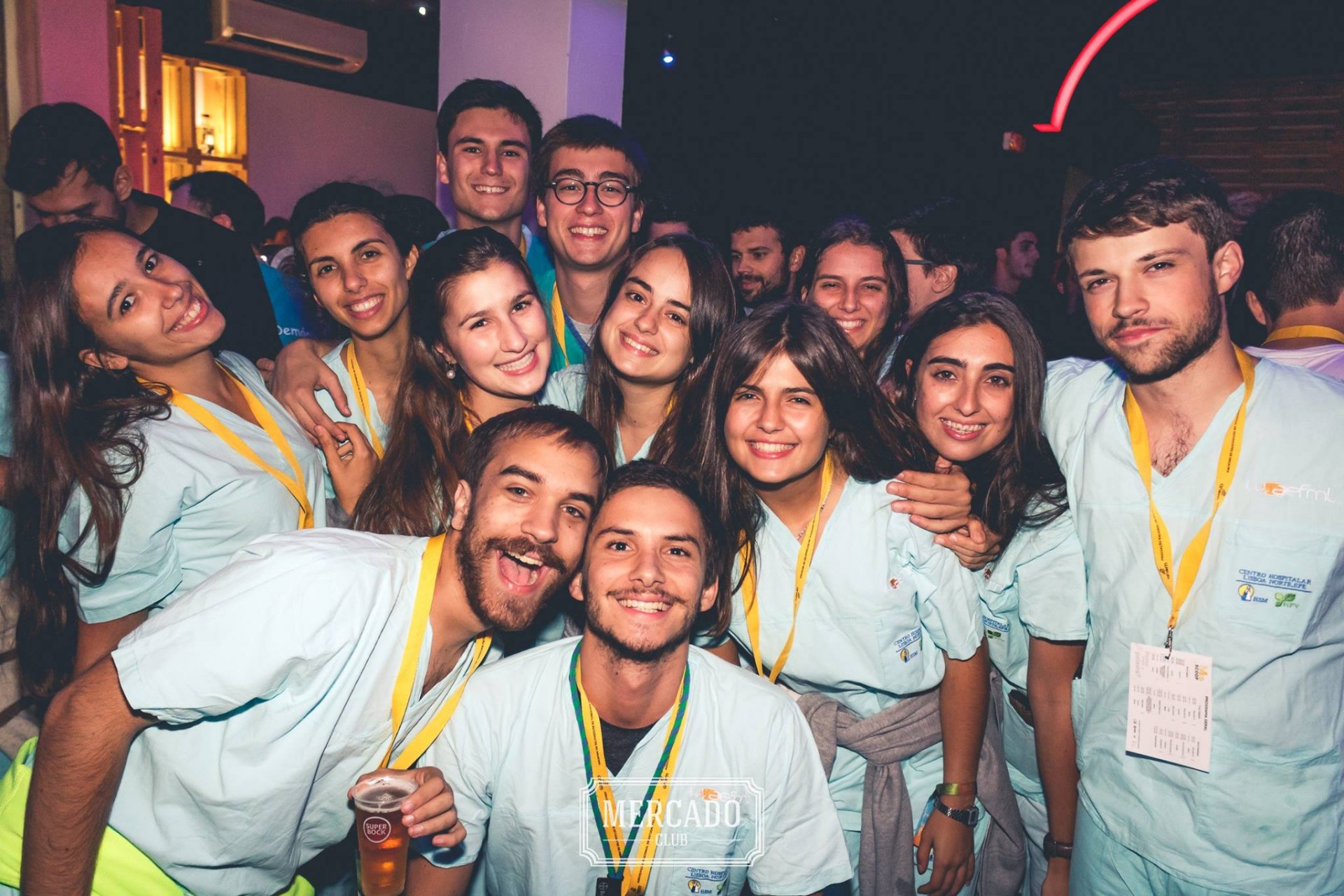
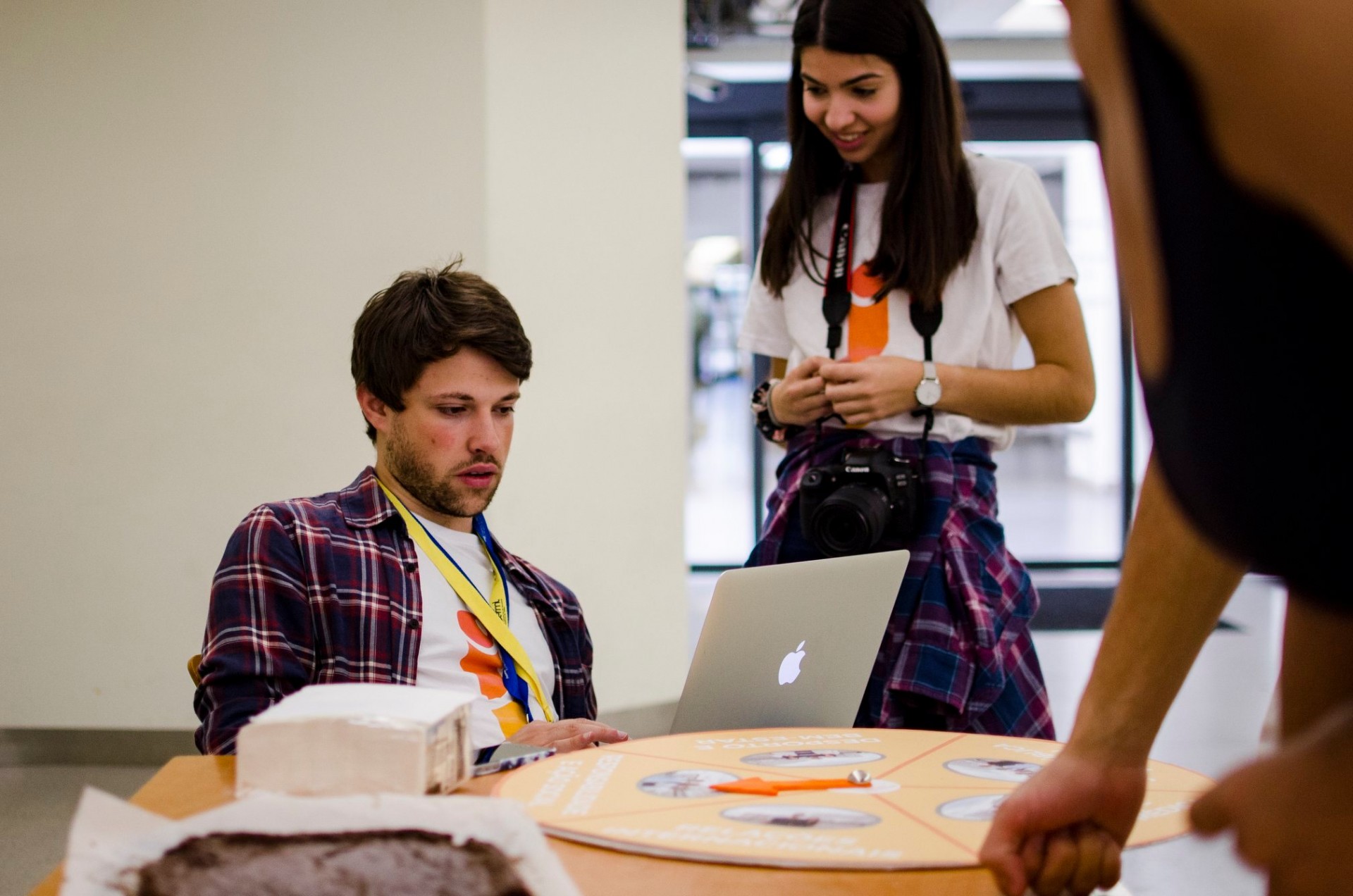
I checked your photos from the time of high school until your current moment at the Faculty. And the photographs show a time transition. One feels the change of attitude in the most recent photos, perhaps less spontaneous, or free. Does responsibility weigh on your shoulders?
José Rodrigues: This is difficult ... (Sighs and thinks) It is always difficult to distinguish this evolution between the ages of 18 and 23, because it is a time when the person himself grows and gets more mature, especially when one goes to the Faculty, changes city and starts living without the parents. These transitions alone would bring change, but of course that responsibility adds weight on our shoulders. The idea that we represented the AEFML was very important. I learned a lot from Rafa (Rafael Inácio, President for the 2016-2017 term and currently a Paediatrics intern at SMH), for example, and there were always values that he and the Board of that year instilled in us, like this notion of responsibility. But, again, this is another preparation for the life of a doctor. I have been in an internship in Internal Medicine for two weeks, and despite being a mere year 6 student, the burden of responsibility is immeasurably greater than everything I have experienced so far.
Will you tell us about your new phase of life, having contact with the patients of Santa Maria Hospital?
José Rodrigues: It is having a huge impact, I feel it is the culmination of 5 years that were not only classes, but also what was done outside classes. And what was done at the AEFML prepared me a lot.
Has being at AEFML enriched you to be with a patient today?
José Rodrigues: Yes, because apart from the theoretical knowledge that we have to have, many of the skills I have and the way I am now, were positively reinforced from what I was doing at the AEFML. I do not say that everyone has to do it, but the fact that working on different projects, with different teams, leaving our comfort zone, talking to other people and developing ideas, are tools that enrich our degree. Apart from very few brave students, what we do is very linear. Six years doing the IMDM and then the final exam, followed by obtaining a place for the common year, and after that getting a place for the specialty training... it is in fact amazing how these skills are so useful in our year 6. Although we are aware of the frightening numbers of the lack of places for specific training in Medicine and of the fight by the AEFML itself, through the ANEM, and also of the Council of Portuguese Medical Schools (CEMP) to fight the places’ limitation, the truth is that the path in Medicine is very linear, if we take into account all these steps.
So who are these "few brave students "?
José Rodrigues: Those who decide not to exercise the medical activity and, as such, do not do the internship. They do other things related to Health, be it management and health, or health policies and those will increasingly be relevant roles in the greater professionalization of the area.
On one of the days of welcoming the new students, you arrived just in time for the event, something you have never done to date, because you had come straight from the internship, as you mentioned. Where did you learn what you apply to others today? Did you practice on yourself? With your family? On one does not practice? And how do you communicate, can it be learned?
José Rodrigues: It is an interesting challenge. We always have the very present figure of the tutor who guides us a lot. But it is right here that one realizes that the art of being a doctor is one of learning with mentors and other prominent persons. The advantage of being on an internship every day is that you learn all of this. The most communicational part is already well covered in practical classes of years 4 and 5, although not as intensively. I think anyone at our Faculty will be well prepared, wherever they go. And for two very relevant aspects. First: due to the extra-curricular nature of the Faculty, very few students have never participated in an organized activity where these characteristics are all well developed. Second: here it is inevitable to speak of Professor Barbosa, all the subjects he was responsible for gave us great sensitivity. Right in year 1 in the Introduction to Medicine subject, which focuses a lot on the patient, in a year when we only study the micro, that is, the molecule, the bone, Anatomy and we still do not see the person as a whole. Then all the other subjects the Professor was responsible for, namely Psychiatry and Mental Health, are very important to understand real life and to learn how to approach patients.
I know that you only started your internship a short time ago, but has there ever been a situation when you thought, "I don't know what I'm doing here"?
José Rodrigues: (Remains silent for a long time) Since the beginning of the degree, as I had to learn and study more complex subjects, I thought about it. But it is part of the normal learning process. First comes anger and complete denial of our lack of understanding and then it is a personal process of taking it easy and studying; but knowing how to ask for help is also very important. I counted on the help of friends who always helped and guided me when I was most lost. Another idea that is very well represented in the Mentoring Project is to show that what some are going through today, we have also gone through it and that many of these people today are brilliant professionals.
This year of your management was marked by your refined diplomacy. Has this principle always been instigated by your parents? Or did it come completely from you?
José Rodrigues: I think this characteristic really comes from me, I always try to be consensual. I don't like anyone to be bad, which is not always a positive thing, because people sometimes have to break down so that something better comes out of it. But I am very much in favour of consensus and that all parties are minimally satisfied. In the relationship with the Faculty, it has always been much like that. We always represent the students of the Faculty and it must be borne in mind that the management of this trinomial students, Faculty and Hospital is a delicate, but very important, exercise.
Do you think you represented your peers well, or did you suffer criticism?
José Rodrigues: There will always be criticism. For any act or step that takes place, we are subject to criticism. The most important of this criticism is to learn from it. It is a difficult exercise, but it is very important. When someone tells us that they don't agree, or that they found something wrong, it makes us think about what needs to be improved. I even think that we should have received more criticism to help us identify new issues.
Are you serious when you say that you would have liked to receive more criticism, even if it had been less positive?
José Rodrigues: I’m serious! I should have looked for it myself, because part of what I did differently and tried to solve got less positive feedback. So the more contact there was, the more could have been done. Because we can only act on what we know. And we must not forget that in a Faculty that has a 6-year degree in Medicine, a degree in Nutrition Sciences, Master degrees, Ph.D.s, etc., it is normal that there is a lot of things that we don’t know about. You know, I think that whoever makes the decision has all perspectives and that's why it's also up to us to give feedback, even if it is to acknowledge that we were wrong. In fact, it is a gesture of greatness to acknowledge when you have made a mistake.
Was there anything in your term that could have been managed differently and that points to a mistake you have made?
José Rodrigues: Yes, the exams done at a distance, which could have been better resolved, but which were a learning experience. We created the Council of Representatives in 2017, a body headed by the President of the Board of the AEFML and which includes the Course Committees, as well as the Students of the School and Pedagogical Councils. We took a position on these exams in a more assertive way than usual, but it was necessary to inform all students, not least because it was yet another new aspect. We received many requests for information, for help, it was a moment of enormous anguish and nervousness for everyone and we had to act. Now, looking at everything from a distance, I think that there could have been more dialogue at the beginning on this matter, I feel that we were not able to dialogue so well with the decision-makers and that resulted in a process more troubled than intended.
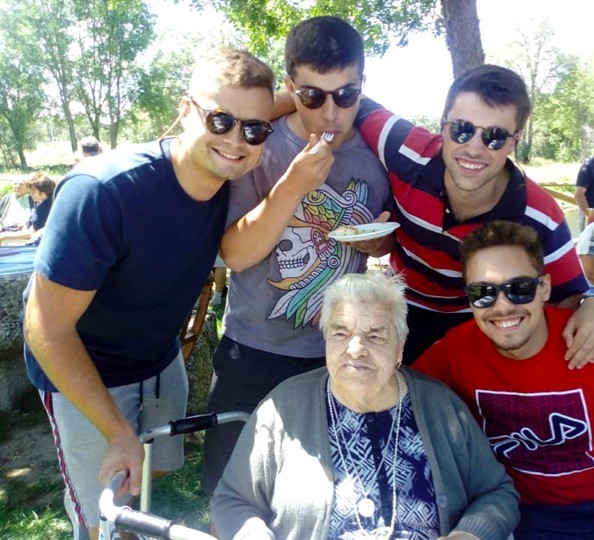
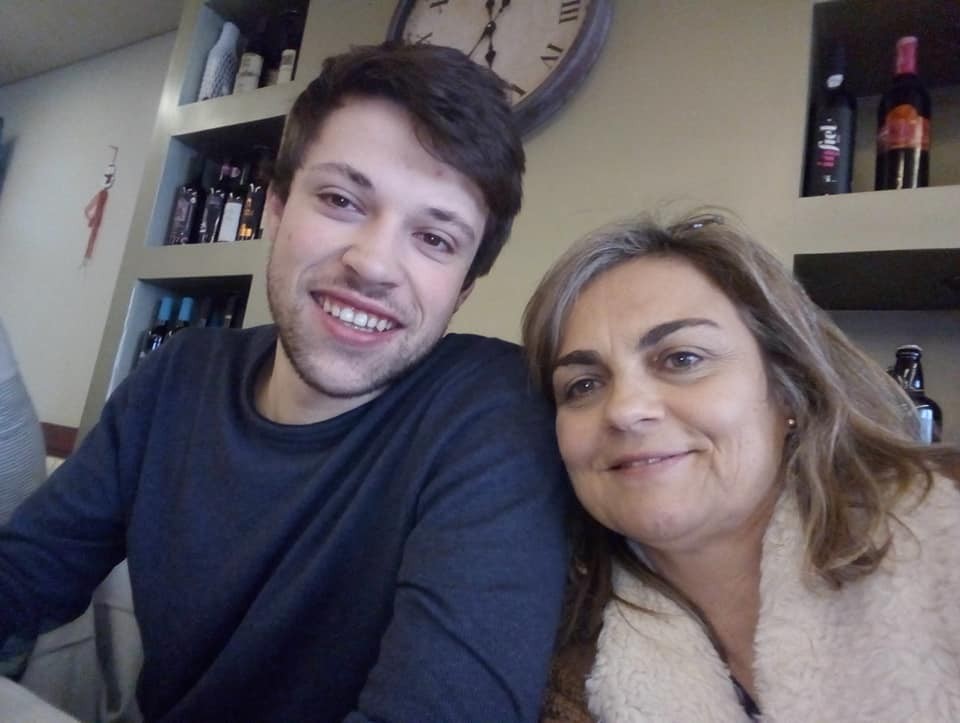
Falávamos há pouco do recolhimento e ao regresso a casa, ao ponto de origem. Como foi voltar a viver com os pais, depois de mais de 5 anos a viver de forma já muito independente?
José Rodrigues: Há duas respostas muito breves que são até um pouco cliché, mas que me parece que respondem de forma muito breve a isto. A primeira é que o ser humano consegue sempre adaptar-se. A segunda é que "o homem é o homem e a sua circunstância", e eu tenho duas circunstâncias muito boas, quer seja na vida que tenho em Lisboa, quer na Guarda, não me posso queixar de nada. Sou um privilegiado, porque adoro a minha vida em Lisboa, com toda a atividade que ela implica e na Guarda viver com a dinâmica de casa, com pais e o meu irmão, é algo que não vai voltar a acontecer tanto tempo seguido e que me soube excecionalmente bem. Foi viver com estes dois dilemas positivos de não saber dizer onde estava melhor, porque estou bem nos dois lados.
Agora, claro, foi um murro no estômago deixar a vida na Faculdade. Mas agora que voltei, já me adaptei a tudo novamente. Mas, desta questão, quero ressalvar que o mais importante é que nem todos tiveram esta sorte, há realidades muito diferentes, quem não tem acesso à internet, ou quem partilhava quartos e não tinha mais opções sentiu-se limitado e passou por dificuldades. E é também missão dos representantes dos estudantes e das Instituições de Ensino Superior pensar em todos os casos, quem tem possibilidades e não tem, para responder aos desafios e assegurar um ensino superior inclusivo e de iguais oportunidades para todos, mesmo numa situação pandémica, que agrava desigualdades.
Nem de propósito falavas de Ortega e Gasset sobre o homem e as suas circunstâncias e eu aproveito para te perguntar onde vais ainda integrar mais um papel na tua circunstância, este agora é o de novo estudante no curso de Filosofia, na Faculdade de Letras?
José Rodrigues: Ainda estou a começar o ano e a avaliar como é que vai ser possível conciliar... Nem consigo responder agora. (Sorri) Mas daqui a uns meses digo-te se é possível ou não e como está a ser.
Achas que te coube a ti a capacidade de aproximar os estudantes da Instituição?
José Rodrigues: Sim. Eu creio que no início do mandato e até à pandemia estávamos a conseguir muito essa relação de proximidade. Estávamo-nos a envolver e a aproximar, na senda do legado que foram os mandatos anteriores. Penso que o trabalho estava a ser enorme nesse aspeto. Mas a pandemia veio mudar o novo normal. E como? Quando as nossas imagens de marca deixam de ser concretizáveis, é um grande desafio a travar. Desafio esse que precisa agora de uma nova equipa. Daí a importância de sairmos para darmos espaço aos próximos "loucos" que aí vêm. (Ri) Sabes que estar aqui faz com que sejamos melhores pessoas, levamos ensinamentos para o resto da vida.
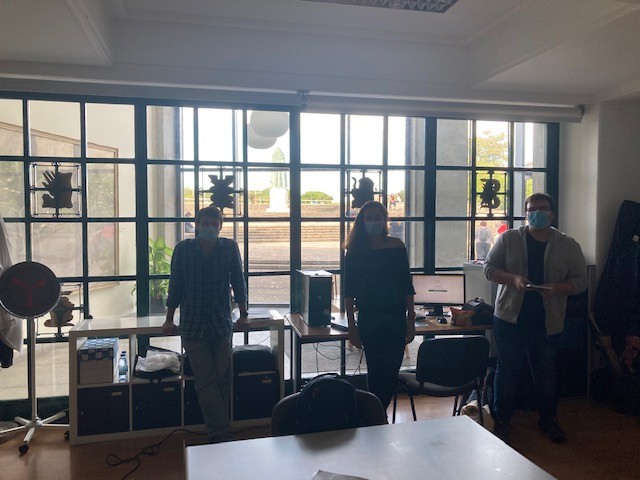
We were just talking about the lockdown and returning home, to the point of origin. How was it to live with your parents again, after more than 5 years of independent living?
José Rodrigues: There are two very brief answers that are even a cliché, but it seems to me that they respond well to this. The first is that human beings always manage to adapt. The second is that "man is man and his circumstance", and I have two very good circumstances, whether in the life I have in Lisbon or in Guarda, I cannot complain about anything. I am privileged, because I love my life in Lisbon, with all the activity that it implies and in Guarda living with the dynamics of home, with parents and my brother, is something that will not happen again for so long, and that felt exceptionally good. It was living with these two positive dilemmas of not being able to say which was better, because I am well on both sides.
Now, of course, leaving life at the Faculty was a blow to the stomach. But now that I'm back, I've adapted to everything again. But, on this issue, I want to emphasize that the most important thing is that not everyone was this lucky. There were very different realities, those who do not have access to the internet, or those who shared rooms and had no more options felt limited and went through difficulties. And it is also the mission of student representatives and Higher Education Institutions to think about all cases, who can afford it and who cannot, to respond to the challenges and ensure an inclusive higher education and equal opportunities for all, even in a pandemic situation, which exacerbates inequalities.
You appropriately referred to Ortega y Gasset about man and his circumstances and I take the opportunity to ask you how are you going to make room for yet another role in your life, that of student in the Philosophy Degree at the Faculty of Humanities?
José Rodrigues: I am still beginning the year and assessing how it will be possible to combine things... I can't even answer now. (Smiles) But in a few months I will tell you if it was possible or not and how it is going.
Do you think you had the ability to bring students closer to the institution?
José Rodrigues: Yes. I believe that at the beginning of the term and until the pandemic, we were achieving this close relationship. We were getting involved and getting closer, in the path of the legacy of previous mandates. I think the work was going to be huge in that respect. But the pandemic has changed the new normal. And how? When our brand images are no longer achievable, it is a great challenge to tackle. This challenge now needs a new team. Hence the importance of going out to make room for the next "crazy people" who are about to start. (Laughs) You know that being here makes us better people, we take lessons for the rest of our lives.
I propose to end the conversation at the AEFML.
For all intents and purposes it is farewell to something that is almost over.
We cross the garden again. He checks the time and is amazed by "so much time has passed, I didn't realise”. After 1h30, time flies when we want it to stop and wait for us. As we pass the helipad and dozens of students are already on their way home, I ask him what he would like to see in the continuity of his work. He tells me that he wants people to be happy doing what they do, because that is the only way to ensure challenges are overcome. If it weren't for the AEFML, I wouldn't have as many friends as I have, he stresses. Several familiar faces pass by, wishing each other a good weekend, the last messages that had been interrupted by the noise that invades the corridor of the main entrance of the Faculty are given. There is always a nostalgia that seems to be perpetuated each time we read the Hippocratic oath written on the white stone on the walls of the main entrance. On the way back to the Students' Association, we met Humberto, Vice-President, and Inês Carolino, from Image. Each is addressing issues with dynamism as if it were still the start of a dream. On the walls there are photographs that illustrate a moment that now seems short and that marked the last year and a half. Humberto also passes on some final concerns before definitively ending his term.
I continue to record, because for the first time it was not clear to me when the interview ended.
Like an apartment that will receive new occupants soon, I capture the images on the walls, filled with photographs and faces responsible for so many moments that we have all seen. The farewell is inherent to me too.
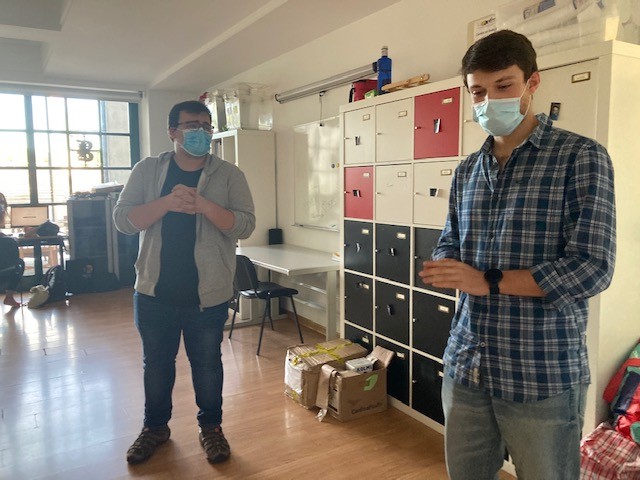
After leaving your position, will you continue to enter this room?
José Rodrigues: (Everyone laughs) Some of us will continue to be linked to the General Students Meeting Table, or to the Supervisory Board, but we have to give the newcomers a lot of time. We need to assimilate what was this long lasting and very intense relationship and we need to organise in our heads the things that we didn’t like and just keep the good memories. And it is necessary to give space to the newcomers, because our presence would limit this new group and that is not desirable.
As you leave, don’t you have the feeling that you are abandoning "a son"?
José Rodrigues: I think not because the son will be in good hands. What happened here was more like a babysitting that goes now to better parents. We will miss him, but we are never afraid to leave the AEFML in bad hands!

On 20 October, José Rodrigues will be part of the occasion that marks a mandate change. This interview will come out after the start of office of someone who will inherit adverse times, and the mission of continuing to honour the more than 100 years of history of an Association that had some of its most brilliant doctors and researchers as members.
Now on an internship in Santa Maria Hospital until December, the quasi doctor José will later go to Guarda to be in contact with General and Family Medicine, then Paediatrics and Surgery will follow at the Amadora-Sinta Hospital, and subsequently he will return to Santa Maria to finish, in apotheosis, in one of the areas where he learned the most, Mental Health and Psychiatry.
To Zé, the Faculty gives its greatest thanks for the cooperation and mutual assistance, for the long hours he made when it was necessary to ask him for help and sometimes also help him, for the holiday he interrupted to deal with emergencies not always his own.
In the murals of memory that not always registers all those who passed through it, there is a little of the soul of someone who broke the barriers of hierarchy, showing that harmony and extreme correction were his greatest weapon to captivate the most obstinate. The same weapon that brought together the most critical and brought the opposites together.
A new path is looming on the horizon, a path that we do not yet know the meaning of, but that one day we may cross again.
Good luck!
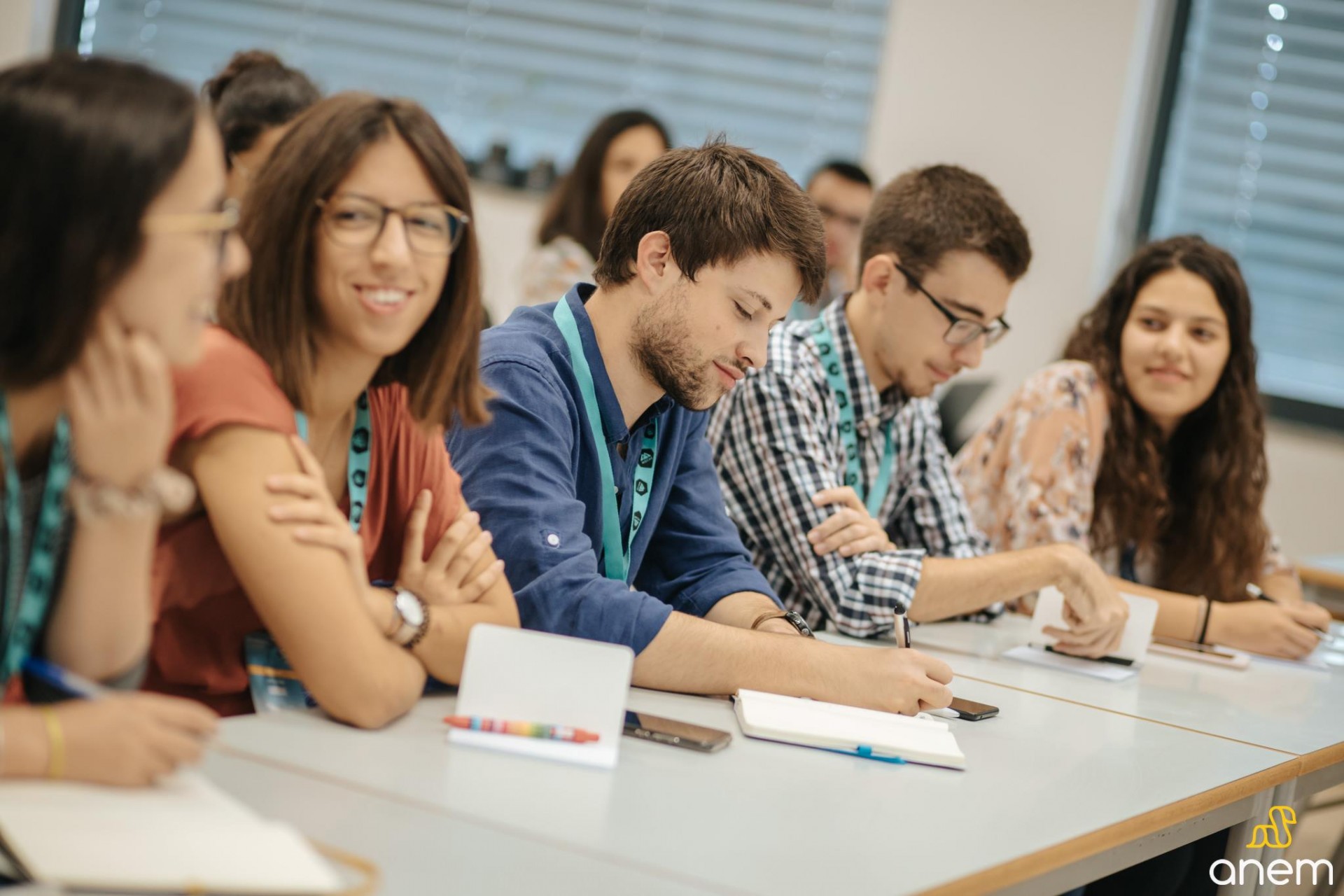
Joana Sousa
Editorial Team


